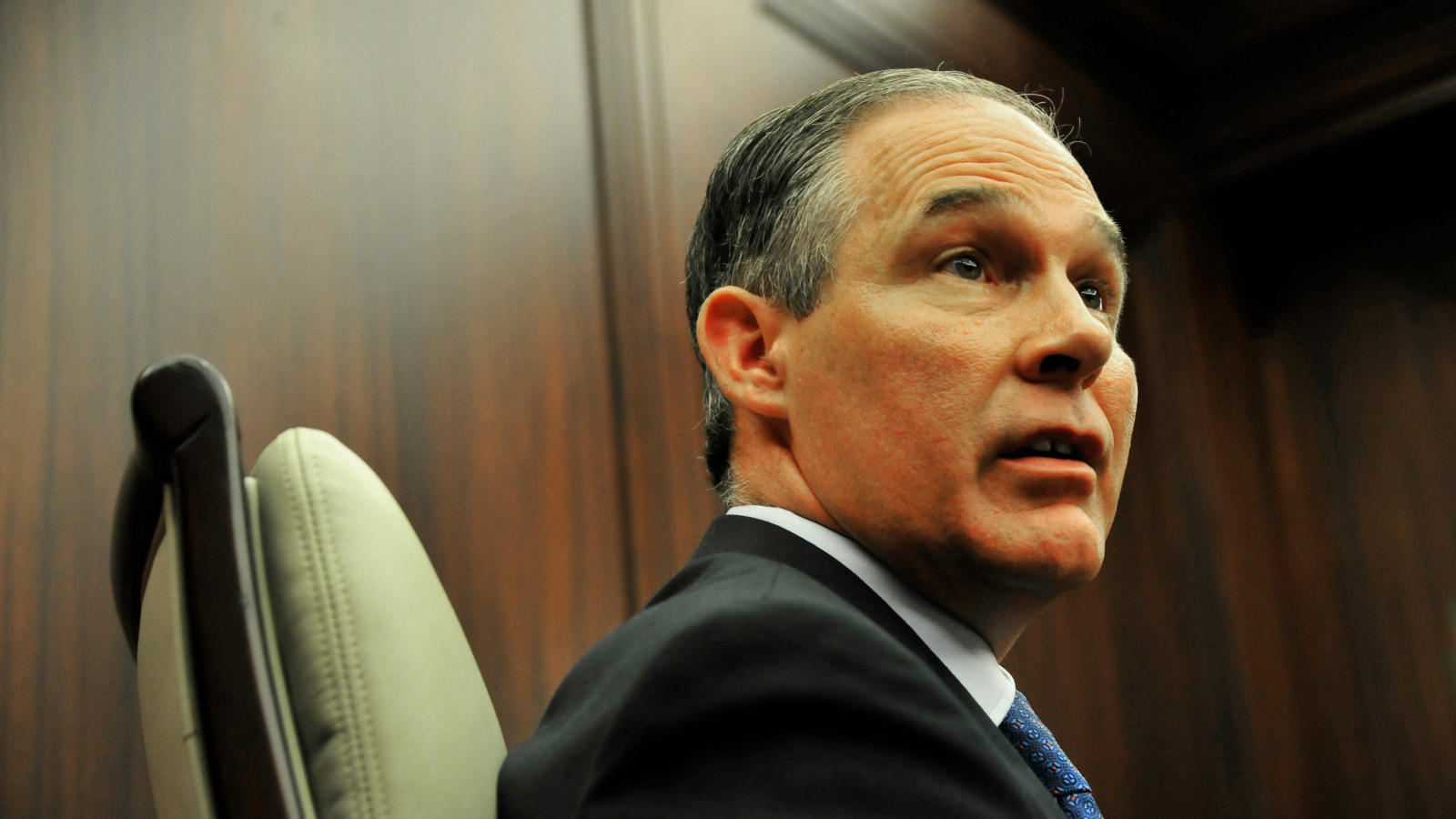Fireworks are guaranteed at the upcoming confirmation hearings on President-elect Trump’s nominee for EPA administrator, Oklahoma Attorney General Scott Pruitt. Pruitt is an avowed climate change denier with close ties to the oil and gas industry who has sued the EPA over a dozen times to block air, water, and climate regulations. These hearings typically generate more heat than light, but there are serious questions that should be asked about the direction the EPA might take under Pruitt’s leadership. Here are 10 that frame some of the major concerns.
- As attorney general, you advocated positions on behalf of the oil and gas industry, including signing letters and position papers drafted by energy companies, at the same time that you were raising money from those companies for your campaign and for Republican attorneys general. Do you see any conflict of interest in that behavior? Will you continue to collaborate with energy companies in your role as the chief environmental enforcement official for the United States? Will energy companies be allowed or encouraged to draft EPA regulations and policies?
- Notwithstanding the virtually unanimous view of climate scientists that humans are responsible for climate change, you have written that the science is still “far from settled.” In fact, you sued to overturn the EPA’s determination under the Clean Air Act that greenhouse gases are a threat to human health, known as the “endangerment findings.” You lost that case in the D.C. Circuit and the Supreme Court declined to review it in UARG v. EPA. Are you still determined to review and possibly reverse the endangerment findings?
- You have said the Clean Power Plan “is entirely inconsistent with [the EPA’s] constitutional and statutory authority.” Yet the Supreme Court in Massachusetts v. EPA held that the EPA has a mandatory duty to regulate and reduce greenhouse gases from both stationary and mobile sources to the point where they no longer pose a danger to public health and the environment. And in AEP v. Connecticut, the Supreme Court ruled that section 111(d) of the Clean Air Act, upon which the EPA relies for the Clean Power Plan, provides explicit authority to regulate greenhouse gases from power plants. A challenge to the Clean Power Plan is now pending before the D.C. Circuit. Should the court rule in the EPA’s favor, and against the position you have argued, would you be willing to reconsider your position and abide by the court’s decision? Or will you take steps to kill the plan through a new rulemaking or congressional action?
- Democratic attorneys general in 15 states plus four cities and counties sent President-elect Trump a letter asking him to preserve the Clean Power Plan. The letter lists local impacts of climate change, including drought in California, catastrophic storm surge in New York City, a record deluge on Colorado’s Front Range, high-tide flooding in Virginia and South Florida, and diminished shellfish harvest in Oregon and Washington state. The letter points out that states have demonstrated how to cut emissions while keeping electricity affordable and reliable, creating jobs, and growing the economy. As an advocate for giving states more say in how federal environmental policy is formulated, how will you factor in these concerns by states on the front lines of dealing with climate change?
- In response to multiple calls from Supreme Court justices to clarify the jurisdictional reach of the Clean Water Act, the EPA promulgated the Clean Water Rule (also known as WOTUS, or Waters of the United States) in 2016. You joined with a number of other state attorneys general and industry groups to challenge the rule and have called it “the greatest blow to private property rights the modern era has seen.” The rule was stayed by the Sixth Circuit and is awaiting a hearing on the merits. WOTUS was based on extensive, peer-reviewed scientific study and was evaluated and endorsed by the Science Advisory Board, the body established by Congress to advise the EPA administrator to ensure the scientific integrity of rules. Will you allow the judicial process to run its course to determine the legal validity of the rule or will you seek to truncate that process by initiating a rulemaking to “repeal and replace” it with a weaker rule that eliminates protection for wetlands and lakes that have previously been covered by the Clean Water Act?
- You sued to overturn the Cross-State Air Pollution Rule, which curbs sulfur dioxide and nitrogen oxides, the primary ingredients of soot and smog. These pollutants cause aggravated asthma, bronchitis, cardiovascular disease, and premature death. You also sued to invalidate the Mercury and Air Toxics Standards (MATS), which limit mercury, cyanide, arsenic, and other pollutants that have been linked to neurological damage, heart disease, and birth defects. Together, the Cross-State Air Pollution Rule and MATS are projected to prevent 18,000 to 46,000 premature deaths and save $150 billion to $380 billion in health-care costs each year. You also sued to prevent the EPA from implementing a rule that would reduce ground-level ozone, or smog. As administrator, will you vigorously enforce these rules or will you seek to weaken them?
- Eight of the lawsuits you filed against the EPA are still pending. These include challenges to the Clean Power Plan and the Clean Water Rule. Your successor as Oklahoma attorney general is expected to continue prosecuting these cases. Federal ethical guidelines require that a public official should not act on a matter if a reasonable person who knew the circumstances of the situation could legitimately question his or her fairness. The public must have confidence that decisions affecting their health and well-being are being made by agency heads with no predetermined bias. Will you recuse yourself from any involvement in these cases or in subsequent administrative proceedings involving changes to the regulations that are the subject of these lawsuits?
- Coal ash, created when coal is burned by power plants to produce electricity, typically contains heavy metals including arsenic, lead, mercury, cadmium, chromium, and selenium. Coal-fired power plants generate more than 100 million tons of coal ash a year, which is typically stored in unlined pits and surface impoundments. Failures at these poorly designed facilities have contaminated rivers in Tennessee, Virginia, North Carolina, and other states as well as groundwater in many communities. Airborne ash from open dumping also exposes people to hazardous air pollutants, as documented in Bokoshe, Oklahoma. In 2014, the EPA adopted a rule to better regulate the disposal of these toxic wastes. In response to challenges from both industry and environmental groups, the EPA obtained a voluntary remand and is currently revising the rule. Will you move quickly to reissue the rule or will you kill it?
- In Juliana v. U.S., the Oregon federal district court recently ruled that a stable climate system capable of sustaining human life is a fundamental right guaranteed by the due process clause of the Fifth Amendment to the U.S. Constitution. The court has set the case down for trial later this year and discovery is underway. The EPA is one of the named defendants. What specific actions will you take as administrator to ensure you are not violating fundamental constitutional rights to a livable climate?
- Are there any EPA public health rules that you do support?
With Republicans controlling the Senate and with the filibuster rule for cabinet appointments having been repealed (by the Democrats), Pruitt’s confirmation is all but assured. His confirmation hearing will be mostly political theater. Even if questions like these were posed, it is doubtful candid answers would be forthcoming. Still, senators have a duty to ask them and the public has a right to know more about the people who will be in charge of enforcing environmental laws. But whether or not these questions are posed at the hearing, it will soon be clear from Pruitt’s actions what the answers are.


